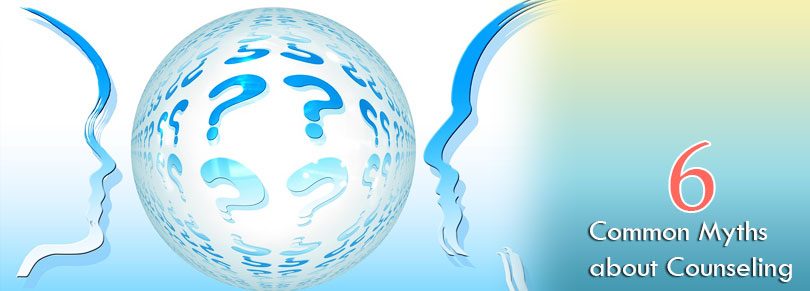There are several myths about counseling in our society today. Although at times we come face to face with those myths and ideas, we seldom take the time to challenge or dialogue with them, thereby discounting the whole idea of counseling and its effects. When a need for counseling arises, it is important to address, clarify, and combat some of the common ones so that an informed decision can be made about seeking counseling. Let’s examine these myths here.
Myth #1: Counseling is for ‘crazy’ or ‘weak’ people.
Reality: Unfortunately, this is a common mindset today. Surprisingly, this idea is still prominent even among the elite and highly-educated society. Imagine that you have a broken leg. What would it be like to have a stigma around your broken, plastered leg that every time you tell others about your injury, they make fun of you, label you crazy or call you weak? What if people around you tell you to be strong, hang in there because this pain will go away in time and thatdoctors are for bigger problems?
I am sure that despite the many voices telling you otherwise, you will ignore those opinions and choose to go to a doctor at least to get the problem checked out, because the pain is unbearable and the injury limits your functionality. Any person in their right mind would immediately address the issue of a broken leg and get on the right course of healing. Counseling is very much the same way, and most people who come in for counseling are very ‘normal’, intelligent, smart, and talented. Life brings on stressors, problems, and heartaches that weigh us down. Those stressors will invariably have a positive or a negative impact on us.
No matter what you are faced with in life, counseling is definitely not for the weak, but for those who are strong—strong enough to be open, honest, and brave about the struggles they face, however small or gigantic they may be. Counseling is for those who have the courage to face life and turn their mundane, ordinary lives brimming with creativity and fruitfulness.
Myth #2: Counseling is only for severe problems.
Reality: Who decides if the problem is ‘severe,’ ‘little’ or ‘big’? Often, we have no inkling of how a problem could affect us. We are all uniquely and intricately made, and we react to different things differently. What might be stressful for one person might not be so for another. Of course, counseling can be helpful for severe problems, but sometimes we make the mistake of waiting it out until the problem gets so bad and is brewing over to other areas of our lives, destroying relationships, friendships and functionality. Why wait until problems have become huge mountains? Isn’t it better to nip them off at the bud? It is always helpful to change and address an issue right when it is disturbing our minds rather than when it is spilling over to different areas of our lives.
Myth #3: What goes on in the family should stay in the family rather than seeking help from a stranger.
Reality: It is indeed beautiful when a family protects and supports its members when they are faced with life’s many challenges and worries. However, many times although families try their level best to keep it together, they sometimes fail to cater to the needs of every member of the family objectively. Sometimes problems can be so intimidating or overwhelming that it is hard to see a way out. When families get caught up and soaked in problems, every member may be affected in different ways. Often blind spots are overlooked, individual desires are compromised, and objective and unbiased decisions are not made. As a result, families may give into unhealthy patterns of coping and deeper dissatisfaction.
Trained family counselors can come alongside and listen to various different perspectives of the family members. They can also challenge irrational thoughts and behaviors, and can help family members understand themselves and their situations better, by employing different techniques and methods fit for individual needs.
Fears about whether a counselor who is a stranger will be of any help are quietened when care and guidance is offered in a non-threatening, respectful, empathetic, and confidential way. As time progresses and the rapport is established, you will grow to be more comfortable with your counselor.
Myth #4 Counselors will interrogate, dig into my past, shame, and blame me.
Reality: There are many therapies and therapists who are out there, and not all of them are worth seeing. However, a good counselor will essentially never shame or blame, but rather will help people explore their reasons for certain feelings, actions and outcomes in a non-judgmental way. Often people face various issues that pop up repeatedly from unresolved issues in one’s past. Good and efficient counselors are able to work alongside the counselee to address those issues at a comfortable pace.
Myth # 5: Counselors give advice, offer quick fixes, and have answers to all our problems.
Reality: Counseling is a therapeutic process and never a quick fix for problems. Rest assured, your counselor will not have all the answers to your questions either. Each of our journeys and experiences are different and unique. In order for any kind of change to happen, it takes time, effort, and commitment. Every session is a working session for both you and the counselor alike. Counselors are trained to identify unhealthy and disruptive patterns, explore options and alternatives, make analysis, and help people navigate through their fears, questions, and struggles. Depending on the lethality, severity and dysfunctionality, sometimes counseling can be directive, but it is aimed at empowering an individual to make his or her own choices to live unabashedly, creatively and productively. Counselors prefer to empower rather than overpower counselees or curtail them from making their own choices to find healing. Breakthroughs happen when people are patient and compassionate to themselves, let themselves feel the pain, and work towards recovery with their therapist.
Myth # 6: Counseling will ‘fix’ my partner and my relationship.
Reality: As hard as it is to take in, counseling is not about ‘fixing’ your partner, but rather working towards making the marriage purposeful, joyful and fruitful. We sometimes feel that it is the other person who needs to change and if only they could get their act together, things would be much smoother and life would be happier.
It is hard for us to look within ourselves, to even admit that we too, are a work in progress. It is much easier to blame, correct, and insist on changing others rather than focus on changing ourselves. Counselors will help you see your relationship in a new way and enable you to work toward greater change and togetherness with your partner, but this can only happen with your willingness and efforts to change yourself first, not forgetting that the best kind of change is the change that comes from within us.
“And the day came when the risk to remain tight in a bud was more painful than the risk it took to blossom.” -Anais Nin
Counseling is only as effective as one’s willingness to blossom.






Leave a Comment